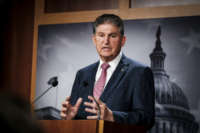
After the Biden administration canceled $415 million of student debt for victims of for-profit colleges, Sen. Bernie Sanders (I-Vermont) called for all student debt to be canceled, a move that could relieve tens of millions of borrowers of what is often a huge financial burden.
On Wednesday, the Education Department announced that it was canceling debt for students who were misled by for-profit colleges like DeVry University. The agency has been fielding complaints from borrowers and has found that the institution made “widespread substantial misrepresentations about its job placement rates.”
Advocates and lawmakers lauded the decision, but pointed out that there is still more to be done if the administration is to substantially address the student loan crisis.
“Good,” Sanders wrote on Twitter. “Now cancel the remaining $1,883,214,046,704 for 44,984,000 other Americans who are still drowning in student debt.”
A mass nixing of student loans for victims of for-profit colleges has been years in the making; during the Trump administration, judges ordered the Education Department to cancel student loans for for-profit college victims, but former Education Secretary Betsy DeVos refused to do so.
In a press release announcing the cancellation this week, the agency said that it has so far canceled about $2 billion for about 107,000 borrowers under this program. Overall, Joe Biden has canceled over $13 billion of student loans as of January.
As Sanders pointed out, however, this is a miniscule amount of money when compared to the amount of student debt that is currently held by borrowers across the country.
According to Federal Reserve data, borrowers held a collective roughly $1.75 trillion in student loan debt as of December, a record amount. Other estimates from the Student Debt Crisis Center peg the amount a bit higher, at about $1.88 trillion as of Friday.
Either way, the number is astronomically high compared to the amount that Biden has canceled so far – $13 billion is less than 1 percent of the total amount of student debt weighing on borrowers. It’s also a far cry from the up to $10,000 of debt that the president promised to cancel for every borrower while on the campaign trail.
Indeed, Biden has been dragging his feet on the issue of student debt, even though Democratic and progressive lawmakers have been pushing him to take action on the issue for over a year. In public, he has dodged questions about his failure to cancel debt so far, while the White House has said that it considers restarting student loans after the pandemic-related repayment freeze a “high priority.”
The White House’s sluggishness on the issue and its purposeful obfuscation of Biden’s legal authority to cancel student loans have led debt advocates to cast doubt on whether or not Biden actually wants to address the crisis, despite its huge impact on the economy.
Debt activists are planning a day of action in April to urge Biden to cancel student debt before loan payments are slated to restart in May, which a survey last year found would cause major financial distress for thousands, if not millions, of borrowers.
Economic issues aside, proposals to cancel student debt are popular among voters – which is critical as the country approaches midterm elections that could lead to Democrats losing control of Congress. Recent polling from Data for Progress found that 63 percent of likely voters say that the federal government should eliminate some student debt for borrowers, with a whopping 88 percent of Democrats in agreement on the issue.
In an interview this week, Rep. Alexandria Ocasio-Cortez (D-New York) pointed out that canceling debt would be a “keystone action” for Biden to take ahead of the election this fall, especially as the rest of Democrats’ agenda is stalled in the Senate thanks to conservative Democrats.
This post was originally published on Latest – Truthout.






























